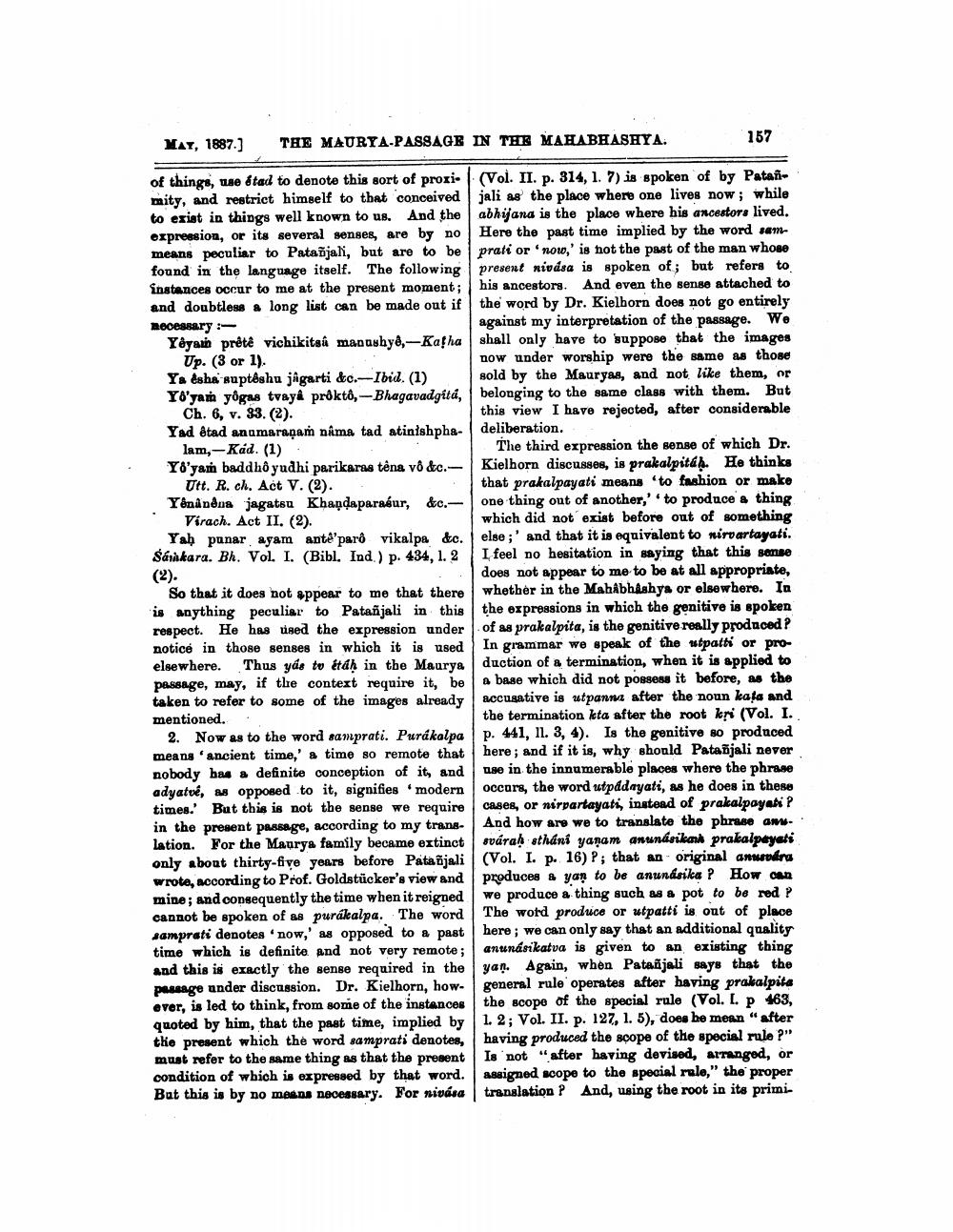________________
NAY, 1887.)
THE MAURYA-PASSAGE IN THE MAHABHASHYA.
157
of things, ae Stad to denote this sort of proxi- (Vol. II. p. 314, 1. 7) is spoken of by Patanmity, and restrict himself to that conceivedjali as the place where one lives now; while to exist in things well known to us. And the abhijana is the place where his ancestors lived. oxpression, or its several senses, are by no Here the past time implied by the word sammeans peculiar to Patañjal, but are to be prati or now,' is not the past of the man whose found in the language itself. The following present nivása is spoken of; but refers to instances occur to me at the present moment; his ancestors. And even the sense attached to and doubtless a long list can be made out if the word by Dr. Kielborn does not go entirely necessary :
against my interpretation of the passage. We Yêyan prêtê vichikitsa man ashyê,-Katha shall only have to suppose that the images Up. (3 or 1).
now under worship were the same as those Ya éshe kuptéshu jägarti &c.-Ibid. (1) sold by the Mauryas, and not like them, or Yo'yan yogas tvayê prồktô, - Bhagavadgitá, belonging to the same class with them. But Ch. 6, v. 33. (2).
this view I have rejected, after considerable Yad êtad anumarapań nima tad atinishpha- deliberation. lam,-Kád. (1)
The third expression the sense of which Dr. Y6'yen baddhô yudhi parikers têna vô c.- Kielhorn discusses, is prakalpital. He thinks Utt. R. ch. Act V. (2).
that prakalpayati means 'to fashion or make Yênandus jagatsu Khandaparabur, &c.- one thing out of another,''to produce a thing Virach. Act II. (2).
which did not exist before out of something Yah punar ayam ante'parê vikalpa &c. else ;' and that it is equivalent to Nirvartayati. Sárikara. Bk. Vol. I. (Bibl. Ind.) p. 434, 1.2 I feel no hesitation in saying that this sense (2).
does not appear to me to be at all appropriate, So that it does not appear to me that there whether in the Mahabhashys or elsewhere. In is anything peculiar to Patañjali in this the expressions in which the genitive is spoken respect. He has used the expression under of as prakalpita, is the genitive really produced ? notice in those senses in which it is used In grammar we speak of the utpatti or proelsewhere. Thus yás tu étáh in the Mauryaduction of a termination, when it is applied to passage, may, if the context require it, be a base which did not possess it before, as the taken to refer to some of the images already
accusative is utpannz after the noun kata and mentioned.
the termination kta after the root kri (Vol. I. 2. Now as to the word samprati. Purákalpa p. 441, 11. 3, 4). Is the genitive so produced means 'ancient time,' a time so remote that here, and if it is, why shonld Patañjali never nobody has a definite conception of it, and use in the innumerable places where the phrase adyatvé, as opposed to it, signifies modern occurs, the word utpddayati, as he does in these times. But this is not the sense we require cases, or nirpartayati, instead of prakalpayadi P in the present passage, according to my trans- And how are we to translate the phrase aww. lation. For the Maurya family became extinct svárah sthani yanam anunásikan prakalpayati only about thirty-five years before Patañjali (Vol. I. p. 16) P; that an original anurodra wrote, according to Prof. Goldstücker's view and produces & yan to be anundsika ? How can mine; and consequently the time when it reigned we produce a thing such as a pot to be red P cannot be spoken of es purakalpa. The word The word produce or utpatti is out of place samprati denotes now,' as opposed to a past here; we can only say that an additional quality time which is definite and not very remote;
anunásikatva is given to an existing thing and this is exactly the sense required in the yan. Again, when Patañjali says that the passage ander discussion. Dr. Kielhorn, how- general rule operates after having prakalpita ever, is led to think, from some of the instances the scope of the special rule (Vol. I. p 463, quoted by him, that the past time, implied by 1. 2; Vol. II. p. 127, 1. 5), does he mean "after the present which the word samprati denotes, having produced the scope of the special rule ?" must refer to the same thing as that the present Is not "after having devised, arranged, or condition of which is expressed by that word. assigned scope to the special rale," the proper Bat this is by no means necessary. For nivása translation ? And, using the root in its primi




